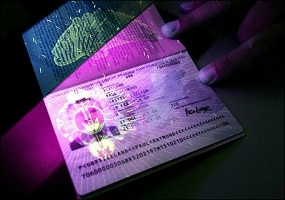The new generation of biometric passports originally slated to launch broadly in 2021 is now set for rollout in India, say reports. The planned full-scale launch follows a successful pilot in which the central government issued 20,000 official and diplomatic copies of the ID document embedded with biometric chips.
In a recent tweet, the Secretary of the Ministry of External Affairs Sanjay Bhattacharyya said the new passports coming soon will be secured with biometric data, will enable seamless passage by its holders through airport checks anywhere in the world, and will be compliant with requirements of the International Civil Aviation Organization (ICAO).
The microchip built into the passport will carry the biometric data of the passport holder. The document is also designed with security features capable of preventing unauthorized data transfers through radio frequency identification (RFID). Reports say that the upgraded nature of the passport is a move by issuing authorities to check cases of identity theft, forgery and also to enable connectivity for easy checks during travels.
According to reports, all the 36 passport issuing centers run by the External Affairs Ministry are cleared to issue the digital ID document, and the process for applying for the biometric passport will remain the same as was the case with the personalized printed booklet format ones.
Meanwhile, the Ministry of External Affairs (MEA) has concluded a deal with Tata Consultancy Services Ltd for the second generation of the Passport Seva Program (PSP-V2.0) aimed at increasing data security for the biometric passports.
The contract has been reported as being worth almost $1 billion over nine and a half years, based on analyst estimates, with a possible two year extension. The PSP-V2.0, the MEA says, is a continuation and modification of PSP-VI.0, which is an instrument used to deliver modern passport-related services to Indian citizens. The upgrade is intended to provide a convenient user experience for submitting biometrics and demographic data.
“The key elements of PSP-V 2.0 are setting up of a state-of-art digital ecosystem, process overhauling and integration among various stakeholders and database, improving citizen interface, upgrading technology, adopting best practices and strengthening data security,” the MEA is quoted as saying in a statement.
“The issuance of e-Passports for enhanced customer satisfaction, increased security and next level of citizen experience will also be unveiled in the upgraded PSP-V 2.0,” it adds.
TCS won the contract for the previous PSP in 2008, setting up 77 Passport Seva Kendras and deploying 2,500 staff throughout India. That contract was reportedly worth Rs 100 billion (roughly US$1.35 billion).








